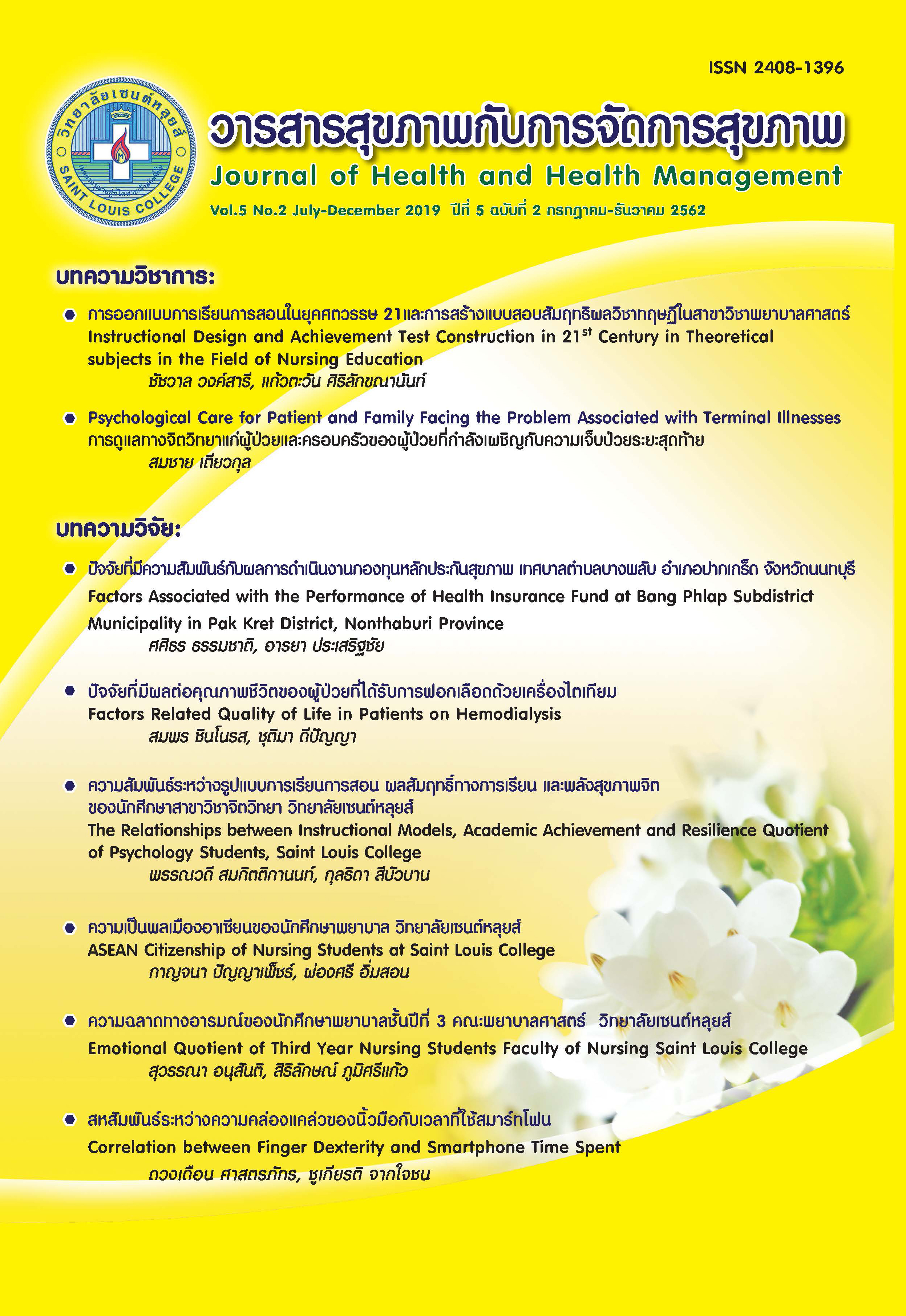The Relationships between Instructional Models, Academic Achievement and Resilience Quotient of Psychology Students, Saint Louis College
Keywords:
instructional models, academic achievement, Resilience QuotientAbstract
The purposes of this survey research were to study:1)the Resilience Quotient of Psychology students; 2)each instructional model pattern; 3) the relationships between each instructional model pattern and students’ Resilience Quotient; 4) the relationships between each instructional model pattern and academic achievement and 5) the relationships between each group of academic achievement and students’Resilience Quotient. The 79 research samples were comprised of the first to fourth year Psychology students. The instruments used in this study consisted of Resilience Quotient Questionnaires and Instructional Model Questionnaires which were divided into; 1. Teacher Led Instruction Pattern and 2. Student Led Instruction Pattern. Data were analyzed by percentage, mean, standard deviation and Pearson Product-Moment Correlation Coefficient. It was found that: 1. The overall mean score of Resilience Quotient of the first to fourth year Psychology students were shown at the normal level (Mean = 63.06, SD = 6.69); 2. the overall mean score of Instructional Models 1 and 2 was at the high level (Mean = 3.86,3.63 SD = .63, .57); 3. The Resilience Quotient was significantly and positively correlated with the overall of instructional model 1 (r =.182, p <.05). But no correlation was found with the overall of instructional model 2 (r =.006), but it was significantly and positively correlated with 2 nd year course of instructional model 2 (r =.412, p <.05); 4. The overall of academic achievement was not correlated with instructional model 1 and 2 (r =-.111,.006), but it was significantly and negatively correlated with lecture of instructional model 1 (r =-.231, p <.01); and, 5. the overall of the Resilience Quotient was significantly and positively correlated with academic achievement of low-grade group (r =.902, p <.05), but it was not correlated with academic achievement of high-grade group (r =.014). It was also found that Resilience Quotient of coping was significantly and positively correlated with academic achievement of medium-grade group (r =.317, p <.05). The results of this study will lead to the development of instructional model and academic achievement to enhance Resilience Quotient of the students.
References
กรมสุขภาพจิต กระทรวงสาธารณสุข (2554). คู่มือการจัดกิจกรรมการเสริมสร้าง พลังอึด ฮึด สู้ (พิมพ์ครั้งที่ 4). นนทบุรี: กระทรวงสาธารณสุข.
พรรณวดี สมกิตติกานนท์, กุลธิดา สีบัวบาน และภัทรกร มุกศรีนาค.(2560). ความสัมพันธ์ระหว่างพลังสุขภาพจิตกับผลการเรียนรู้ในรายวิชาสาขาวิชาจิตวิทยาของนักศึกษาจิตวิทยา. วิทยาลัยเซนต์หลุยส์. วารสารพยาบาลทหารบก, 18 (3), 160-169.
เรณุมาศ มาอุ่น.(2559).การจัดการเรียนการสอนในระดับอุดมศึกษาอย่างมีประสิทธิภาพ.วารสารเทคโนโลยีภาคใต้, 9 (2), 169-176.
วิทยาลัยเซนต์หลุยส์ (2560). หลักสูตรวิทยาศาสตรบัณฑิต สาขาวิชาจิตวิทยา (ฉบับปรับปรุง พ.ศ. 2560). กรุงเทพฯ: คณะจิตวิทยา.
Chung,E., Turnbull,D. & Chur-Hansen,A. (2017). Differences in resilience between ‘traditional’ and ‘non-traditional’ university students. Sage journal.from https://doi.org/10.1177%2F146978741769349.
Fuente ,D. L., Fernandez-Cabezas,M.,Cambel,M. Vera,M.M., Gonzales-Torres,M.C. & Artuch Garde,R. (2017). Linear relationship between resilience, learning approaches and coping strategies to predict achievement in undergraduate students.Frontiers in Psychology. Retrieved from https://doi.org/10.3389/fpsyg.2017.01039.
Grotberg,E. H. (1998). The International resilience project. Retrieved from https://resilnet.uiuc.edu/library/grotb98a.html
Krejcie,R.V.&Morgan,D.W.(1970).Determining sample size for researchactivities. Educational and Psychological Measurement, 30, 607610.
Martin,A.J.(2013). Academic buoyancy and academic resilience: Exploring ‘everyday’ and ‘classic’ resilience in the face of academic adversity. School Psychology International, 34, 488-500. from https://doi.org/10.1177/0143034312472759.
Nguyen,K., Stanley,N.& Stanley,L. & Wang,Y. (2015). Resilience in language learners and the relationship to storytelling. Journal Cogent Education, 2(1).
Nold,H .(2017). Using critical thinking teaching methods to increase student success: An action research project. International journal of teaching and learning in higher education, 29(1),17-32.
Parker,J.L.(2016). Academic Success for the 21st Century Learner:Intrapersonal Intelligence and Resilience.(Doctoral dissertation of Philosophy). Walden University, Minneapolis.
Pendergast,K. (2017). The role of resilience, emotion regulation and perceived stress on college significantly and academic performance (Master’s thesis of science). university of Tennessee, Chattanooga.
Tempski,P., Santos,IS., Mayer,FB. et al.(2015). Relationship among medical student resilience,educational environment and quality of life. Plos One, 10(6):e 0131535.
Walton,D.S.( 2010). Exploring the relationship between resilience and learning styles as predictors of academic persistence in engineering (Doctoral dissertation of Philosophy). Texas university, Corpus Christi. Wheaton,M, O’Connell,B & Yapa,P. (2017). Inter-teaching: Improving the Academic Performance of Auditing Students in Vietnam. Astralasian Accounting, Business and Finance Journal, 10(4),1-16.
Zayac,R.M. & Paulk,A.L. (2014). Interteaching: Its effects on exam scores in a compressed schedule format. Journal of the Scholarship of Teaching and Learning, 14(1), 1–12.




